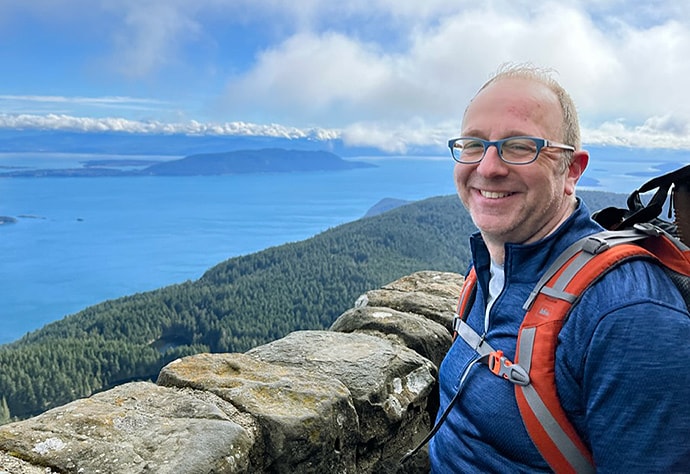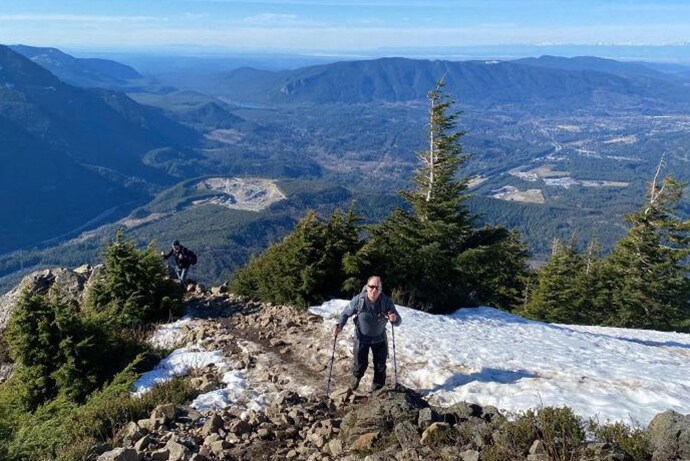The Mount Everest base camps, situated on either side of the world’s tallest mountain, are pitched at an altitude of about 17,500 feet ― a wise decision, as the human body begins to enter a state of decay somewhere between 18,000 and 19,000 feet. Depending on which route is taken, adventurers may find themselves on the more easily accessible Tibetian side of the mountain or making their way along the southern and much more remote Nepalese route.
Samuel Blackman, MD, PhD, who lives on Orcas Island, Washington, is admittedly “afraid of heights and kind of afraid of dying,” but he is still joining a team of 20 other biotech professionals on a trek through the Himalayas of Nepal on the South Col route. The group, led by experienced mountaineer and biotech journalist Luke Timmerman, is hiking for 18 days to raise $1 million for cancer research. Each team member is tasked with raising $50,000 for the cause.
When Blackman got the call about the opportunity in October 2021, he immediately said yes. “I’d been essentially sitting in front of my computer for two and a half years. I felt like I had become a super one-dimensional person,” he told Medscape Medical News. “I’d run out of things to talk about that made my life interesting outside of work.”

Living in rural Washington state offers plenty of opportunities for Blackman to pratice his hiking skills.
Blackman, a self-described “long-haired slacker philosophy major” who had gone on to become a pediatric hematologist/oncologist and to later co-found Day One Biopharmaceuticals, a company that focuses on developing cancer treatments for children, felt “the need to live life to the fullest” kick in hard after that call.
“I’m 53 now,” he said. “I got through the pandemic, and now we’re watching the world come unglued in all sorts of places. The phrase ‘once in a lifetime’ means more to me now than it ever has before.”
To prepare for the journey, Blackman, who helped make ends meet as a spinning instructor while he earned his PhD, has revived his Peloton bike and has taken advantage of the Cascade Mountain Range just beyond his doorstep.
“I Told Myself I Would Never Become a Doctor”
Blackman has always abided by the idea of pursuing things that seem interesting and letting the chips fall where they may. It began as a young man when he chose to pursue a philosophy degree rather than follow in his father’s footsteps and become a physician. “I told myself I would never become a doctor,” he said. “My father is a pediatrician, and growing up, I thought it was the worst job in the world because he was always so busy.”
A chance encounter with the head of bioethics at the University of Chicago, where Blackman studied. set him on a path he had spent his youth dismissing. Later, he was accepted into the MD-PhD program at the university.
“I thought I was going to be an ICU doc, and then I did my first rotation in pediatrics and, wouldn’t you know it, I absolutely and totally fell in love with it, much to my chagrin,” he said. His father, who at that point “had totally given up on him,” of course was elated.
“I’m the best human being I can possibly be and the best doctor I can be when I’m taking care of really sick kids. It’s like a switch flips: You don’t want to let anybody down. You want to go to the ends of the earth to make these kids better.”
Blackman stopped practicing medicine and pivoted to drug development while he and his wife were in the process of adopting a daughter.
“I decided to go into drug development because it would let me do science, let me do medicine, and also let me come home at night. And that’s not to say that doctors can’t come home at night, but for me, I knew that if I was at home and got called in, I would go. That’s my instinct, that’s who I am. And I didn’t want to be forced into that choice.”
A Journey of Self-exploration
Though he doesn’t claim to be a particularly religious or spiritual person, Blackman recognizes that it’s hard to look back on his life and sum it all up as happenstance. From the chance meeting with the bioethicist at the University of Chicago to his decision later in life to pursue drug development, it all led him to this opportunity.

Taking care of himself through physical activity has reinvigorated Blackman. “I feel 10 years younger,” he said. “It’s fantastic.”
“There are so many things I’m looking forward to about this experience,” he said. “Part of me is just looking forward to the newness; it’s a part of the world I’ve never been to. Deep down inside ― and I’ve thought a lot about this ― the thing I’m most looking forward to is feeling the sense of scale.”
For Blackman, part of the human condition involves an inflated sense of self. “Once in a while, I like being absolutely humbled by something incomprehensibly big,” he said. “I’m looking forward to that sense of proportion returning to my life. It makes you stop sweating the little stuff.”
Working in pediatric oncology had a similar effect: “When your frame of reference is children dying of cancer, it makes other things, like not getting a reservation at your preferred time at a restaurant, seem as trivial as they actually are. I think it’s always good for us as human beings to be reminded of the fact that we’re not always as big or as important as we convince ourselves.”
At press time, Blackman and the rest of the team are nearing the end of their journey through the Himalayas. Within 3 weeks of announcing his participation in the trek, Blackman raised nearly $70,000 for cancer research. The group is due back stateside on April 8.
“At the end of the day,” he said, “it’s a reminder of how lucky we are to be in the position that we’re in. To be able to raise a flag and other people come along. It’s a reminder to me of how magical it is to have a life in medicine. We get up every morning and try to serve other people and make their lives better ― how lucky are we to be able to do that every day?”
For more news, follow Medscape on Facebook, Twitter, Instagram, and YouTube.
Source: Read Full Article
